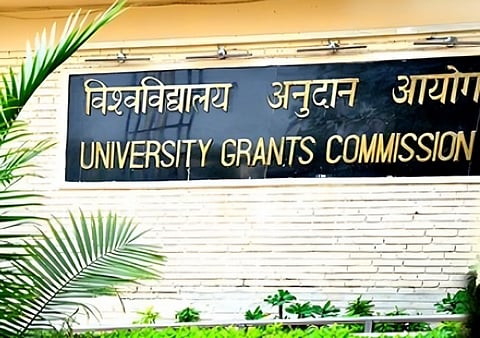

NEW DELHI: The University Grants Commission (UGC) will soon roll out guidelines for the introduction of skill-based courses and micro-credentials in Higher Educational Institutions (HEIs), which will help equip students with practical, industry-relevant skills along with academic knowledge in the rapidly evolving job market.
Speaking to TNIE, UGC Chairman Prof. M. Jagadesh Kumar said the introduction of the guidelines marks an important step in realising the objectives of the National Education Policy (NEP) 2020.
“These guidelines aim to equip students with practical, industry-relevant skills and help them realise their academic goals in a chosen discipline,” he said.
He added that these guidelines aim to address the job market's changing demands and prepare India's youth to become key contributors to a globally competitive knowledge economy.
The guidelines for the introduction of skill-based courses and micro-credentials in HEIs, along with the SOP for implementation, were approved by the Commission in its meeting on November 13.
Prof. Kumar said that India's demographic dividend, characterised by its large and youthful population, holds immense potential for economic growth and global influence.
“However, unlocking this potential requires aligning higher education with the evolving needs of industry and society. NEP 2020 advocates bridging the gap between conventional academic instruction and practical competencies employers seek by introducing skill-based courses and micro-credentials as part of a student's academic journey,” he said.
By integrating skill courses into the existing educational curriculum, HEIs can offer students exposure to emerging fields such as artificial intelligence, data analytics, digital marketing, literary journalism and feature writing, conflict resolution and mediation, digital advocacy and campaigning, logistics and supply chain, sustainable agriculture, digital payments and banking, fashion marketing and e-commerce, and sustainable practices.
“Acquiring skills in these and related fields will provide enhanced opportunities to our students to either become self-employed or seize the new job opportunities emerging in a rapidly digitising and environmentally conscious global economy,” he added.
The guidelines aim to serve as a foundational tool for HEIs across India, with the goal of transforming the landscape of higher education to be more inclusive, skill-focused, and adaptable. “Through these efforts, we empower students to be graduates, skilled professionals, innovators, and leaders of tomorrow,” he said.
The framework seamlessly integrates academic components, skill components, and experiential training. For skill-based courses under the National Higher Education Qualification Framework (NHEQF), credit allocation follows a distinct structure: Theory: 1 credit = 15 hours; Practical: 1 credit = 30 hours; Experiential learning: 1 credit = 40-45 hours.
For courses aligned with the National Skills Qualification Framework (NSQF), 1 credit equals 30 hours of learning, with no distinction between theoretical, practical, or experiential learning.
Additionally, the National Credit Framework (NCrF) allows students to earn up to 50% of their total credits from diverse domains, including skill-based courses or micro-credentials.
For Skill Universities offering specialised skill-based programmes, the skill component can be up to 60% of the total credits, and in exceptional cases, it may be raised to 70% with prior approval from the UGC or the relevant regulatory body.
This flexibility ensures that students receive a well-rounded education, with a significant focus on practical and job-ready skills.
The courses may include short-term skilling, upskilling or reskilling courses at NCrF levels 4.5 and above; National Occupational Standards (NOSs) focusing on specific subjects or skill areas, including foundational skills and upskilling; and micro-credentials (MCs) aimed at upskilling or reskilling in specialised areas through short-term, targeted learning modules.
It also said that internships, undertaken during the tenure of UG/PG programmes, which contribute to skill development and are credited as part of the degree subject to achieving defined learning outcomes and proper assessment processes jointly with the industry/organisation, can also be offered.
Skill-based project work involving defined learning outcomes and assessments conducted in collaboration with industry or institutions with proper assessment processes jointly with the industry/organisation. It states that HEIs can collaborate with various industry associations and chambers of commerce like FICCI, CII, ASSOCHAM and PHDCCI, and trade associations and industrial bodies.
HEIs wishing to offer these skill-based courses/micro-credentials as a credit course need to apply to UGC or to SWAYAM Plus.
It also stated that eligible Indian enterprises of repute and multinational companies interested in offering skill-based courses or micro-credentials need to apply to UGC for approval of their courses.
Any skill-based course or micro-credential that does not receive approval from the Commission cannot count towards the minimum credit requirement for a degree programme. However, it may be offered as an audit course without credits with the approval of the statutory bodies of the HEI, it further stated.